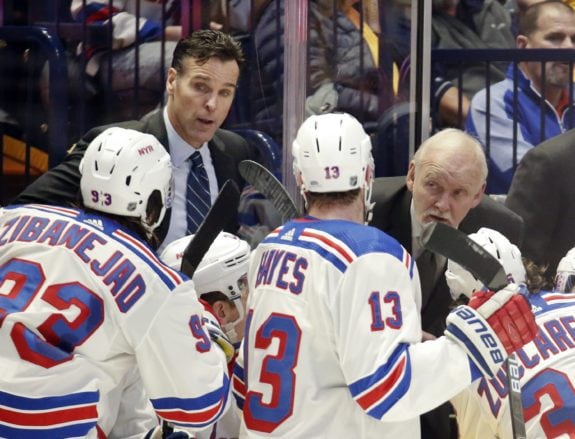Brendan Lemieux sat beneath the Broadway Hat after the New York Rangers’ stirring comeback victory against the Montreal Canadiens over the weekend, his broad smile in contrast to his blackish-purple left eye.
Head coach David Quinn was undoubtedly smiling too. This type of player having this type of impact is what Quinn envisioned when he stated his desire for a “fast, physical and relentless” Rangers team upon signing on before last season.
Artemi Panarin is the Blueshirts’ star and Henrik Lundqvist the veteran rock in net, but young talent is the raw material from which the Rangers will forge a consistent contender. Lemieux is quickly becoming the Rangers’ heartbeat whose evolving leadership is demonstrating his ability to affect the outcome of a game in numerous ways.
The 23-year-old earned the coveted fedora Saturday night with a two-goal performance that powered the Rangers’ 6-5 road win, helping his team erase a 4-0 second-period deficit in what could be a pivotal effort for this mostly green group of Blueshirts.
“I’m sure this term gets used by more than one person, but I know Patrick Roy said it to my dad (Claude Lemieux), and they tried to use it throughout their careers when they were winning, and it’s, ‘Never too high, never too low,'” Lemieux said. “And I think that that was one of those things. You know, we were playing well, and the score didn’t reflect the way we were playing.
“So we just had to stay with it, not too high, not too low, not down because the score’s down, or not up because the score is up, and I think tonight we emulated that.”
Lemieux vs. Wilson Could be Key Moment for Rangers
The Broadway Hat was a fine reward for Lemieux’s offensive effort against the Canadiens. The black eye, suffered two games earlier, also served as a trophy of sorts for a different kind of key performance.
The left winger suffered the injury in a spirited fight with Washington Capitals tough guy Tom Wilson, one of the most feared pugilists in the NHL. Wilson had been pounding away at the Rangers and jawing with Lemieux throughout the night. When Wilson checked Lemieux into Caps teammate Alex Ovechkin late in the third period, Lemieux had had enough.
On getting up, Lemieux immediately dropped his gloves and gave about as good as he got against the bigger Wilson, responding to Wilson’s punch that blackened his eye by landing several shots of his own. As important as Saturday’s rally was for the Baby Blueshirts’ confidence, challenging Wilson can’t be overstated in what turned out to be a 4-1 Rangers win over the NHL leaders Wednesday.
Lemieux refuses to be pushed around and, in standing up to Wilson, he let his teammates know that they can’t allow anyone to push them around. It’s hard to believe that Lemieux’s actions didn’t have a profound effect on his team.
What he brings to the ice every night is commitment, and the rest of the Rangers can see it. Analytics may never be able to quantify that, but its value when it comes to inspiring teammates to match Lemieux’s level of investment in the task at hand is real.
“How well you battle adversity builds character I think, and for our group and for me personally I’ve always tried to do that to the best of my abilities, and I think our group learned a valuable lesson tonight that we’re gonna try to hold onto going forward,” Lemieux said after Saturday’s win.
Quinn, of course, knows that Lemieux walks the fine line of emotions fueling a Rangers win and getting the best of him. Exhibit A was a 6-2 defeat by the Ottawa Senators on Nov. 4, when irritating Sens forward Brady Tkachuk was able to goad Lemieux to distraction – and the rest of the Rangers followed suit, losing focus and the game after taking a 1-0 lead and dominating play in the early going.

“We’ve all talked about us managing our emotions and managing the ebbs and flows of a hockey game, and I thought we did a really good job of that tonight,” Quinn said after the victory over Washington.
Lemieux Needs to Harness Emotions to Continue Rise
The Rangers won again Monday, defeating the Minnesota Wild 3-2 in overtime at Madison Square Garden for their third victory in four games. Lemieux didn’t record a point, but tied for the team high with four shots on goal along with two hits in 17 minutes of ice time. Showing there’s room for growth, he also committed three giveaways.
If Lemieux can harness his fire, as Quinn demands, his impressive versatility will come to the forefront. His willingness to grate on opponents and drop the gloves to protect his team when needed can co-exist with emerging offensive ability – which the Rangers had hoped to tap when they acquired him from the Winnipeg Jets as part of the Kevin Hayes trade last season. Lemieux receives time on the power play as a willing net-front presence and Quinn trusts him on the penalty kill as well; his second goal against the Canadiens was a short-handed tally.

Navigating that emotional tightrope is what Tkachuk does so effectively. More importantly, while there are some differences between father and son’s playing style, Claude mastered that approach across a nearly 20-year NHL career in which he scored 379 regular-season goals and 80 more in the playoffs, often drawing opponents’ fury along the way. The elder Lemieux being in the stands in Montreal on Saturday to watch Brendan’s two-goal effort was fitting.
It’s also the kind of approach and attitude Quinn covets for his team, which remains more skilled and less physical than he would have liked in his second season at the helm. The Rangers’ new heartbeat, however, has recently shown he can inspire his teammates to play the way their coach prefers. In the process, Lemieux is proving just how valuable he could be to the Rangers’ future.